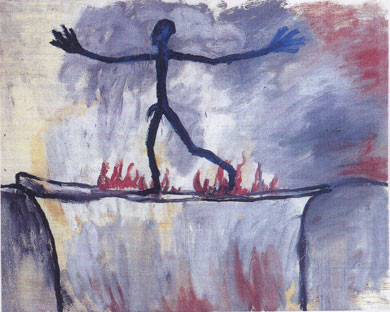Art of Two Germanys / Cold War Cultures
25 Jan - 19 Apr 2009

© A.R. Penck, Der Übergang (Passage), 1963
oil on canvas, 37 x 47 1/4 in (94 x 120 cm)
Sammlung Ludwig, Ludwig Forum für Internationale Kunst, Aachen
oil on canvas, 37 x 47 1/4 in (94 x 120 cm)
Sammlung Ludwig, Ludwig Forum für Internationale Kunst, Aachen
ART OF TWO GERMANYS / COLD WAR CULTURES
Cold War Cultures
25 January - 19 April 2009
For East and West Germany during the Cold War, the creation of art and its reception and theorization were closely linked to their respective political systems: the Western liberal democracy of the Federal Republic of Germany (FRG) and the Eastern communist dictatorship of the German Democratic Republic (GDR). Reacting against the legacy of Nazism, both Germanys revived pre-World War II national artistic traditions. Yet they developed distinctive versions of modern and postmodern art—at times in accord with their political cultures, at other times in opposition to them. By tracing the political, cultural, and theoretical discourses during the Cold War in the East and West German art worlds, Art of Two Germanys reveals the complex and richly varied roles that conventional art, new media, new art forms, popular culture, and contemporary art exhibitions played in the establishment of their art in the postwar era.
Art of Two Germanys is the first special exhibition to go on view in LACMA’s new Renzo Piano designed-building, the Broad Contemporary Art Museum (BCAM). Divided into four chronological sections, the exhibition includes approximately 300 paintings, sculptures, photographs, multiples, videos, installations, and books, by 120 artists. The show features large-scale installations and recreations of major works by Hans Haacke, Heinz Mack, Sigmar Polke, Raffael Rheinsberg, Gerhard Richter, and Dieter Roth, as well as a number of videos and performance-based works. After LACMA, the exhibition will travel to Germanisches Nationalmuseum, Nürnberg (May 23–September 6, 2009), and Deutsches Historisches Museum, Berlin (October 3, 2009–January 10, 2010).
Cold War Cultures
25 January - 19 April 2009
For East and West Germany during the Cold War, the creation of art and its reception and theorization were closely linked to their respective political systems: the Western liberal democracy of the Federal Republic of Germany (FRG) and the Eastern communist dictatorship of the German Democratic Republic (GDR). Reacting against the legacy of Nazism, both Germanys revived pre-World War II national artistic traditions. Yet they developed distinctive versions of modern and postmodern art—at times in accord with their political cultures, at other times in opposition to them. By tracing the political, cultural, and theoretical discourses during the Cold War in the East and West German art worlds, Art of Two Germanys reveals the complex and richly varied roles that conventional art, new media, new art forms, popular culture, and contemporary art exhibitions played in the establishment of their art in the postwar era.
Art of Two Germanys is the first special exhibition to go on view in LACMA’s new Renzo Piano designed-building, the Broad Contemporary Art Museum (BCAM). Divided into four chronological sections, the exhibition includes approximately 300 paintings, sculptures, photographs, multiples, videos, installations, and books, by 120 artists. The show features large-scale installations and recreations of major works by Hans Haacke, Heinz Mack, Sigmar Polke, Raffael Rheinsberg, Gerhard Richter, and Dieter Roth, as well as a number of videos and performance-based works. After LACMA, the exhibition will travel to Germanisches Nationalmuseum, Nürnberg (May 23–September 6, 2009), and Deutsches Historisches Museum, Berlin (October 3, 2009–January 10, 2010).
